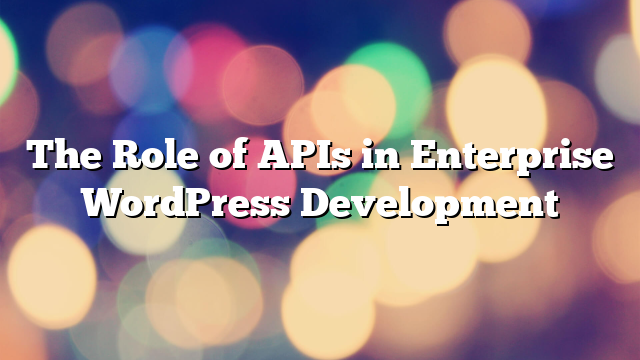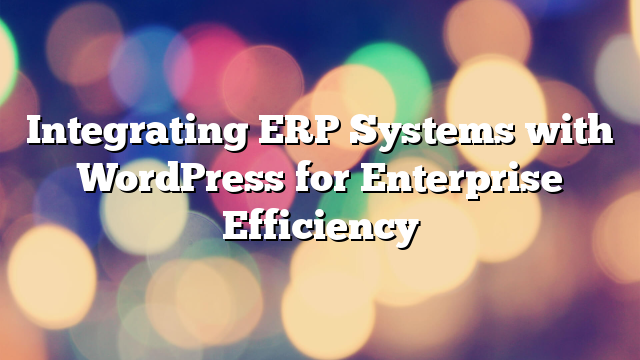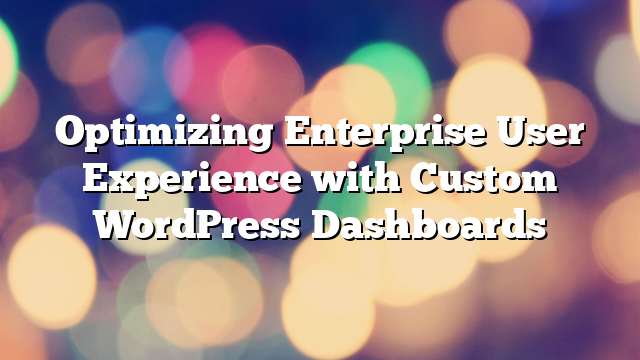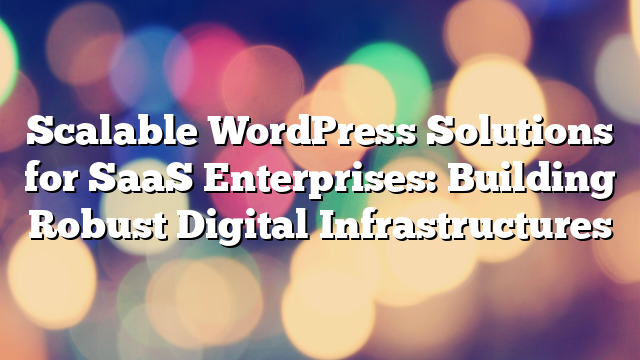The Role of APIs in Enterprise WordPress Development
21.10.2024

In today’s digital landscape, enterprise-level websites demand seamless integration with various platforms, services, and data sources. For large organizations, leveraging APIs (Application Programming Interfaces) is crucial to ensure their WordPress websites can communicate with other systems, automate processes, and deliver dynamic, personalized experiences. APIs open up vast possibilities for enterprises, enabling them to extend WordPress beyond its core capabilities, integrate with third-party services, and develop custom features tailored to business needs. In this article, we will explore the importance of APIs in enterprise WordPress development, the different types of APIs available, and how enterprises can use them to enhance their websites.
What are APIs and How Do They Work?
APIs are a set of protocols and tools that allow different software applications to communicate with each other. They provide a standard way for one application to request and retrieve data or functionality from another application, regardless of the underlying systems or platforms.
In the context of WordPress, APIs enable developers to interact with WordPress itself or integrate with external systems, such as CRMs, ERPs, marketing automation tools, and more. By using APIs, enterprises can automate workflows, pull in data from external sources, or push data from WordPress into other platforms, creating a connected and efficient ecosystem.
Types of APIs in WordPress Development
WordPress supports several types of APIs, each serving a different purpose. Understanding these APIs is essential for enterprises to fully harness the power of WordPress. Below are the main types of APIs used in WordPress development:
1. WordPress REST API
The WordPress REST API is one of the most important features in modern WordPress development. It allows developers to access WordPress data—such as posts, pages, users, and custom fields—using standard HTTP requests. This API opens the door to creating headless WordPress applications, where the front-end of the website is decoupled from the back-end, enabling enterprises to use any front-end technology, such as Next.js or React, for a more dynamic and responsive user experience.
With the WordPress REST API, enterprises can build highly customized and scalable websites, mobile apps, or even integrate with other systems that need to pull data from WordPress. It’s especially useful for enterprises that need to manage large volumes of content or require sophisticated, multi-platform experiences.
2. Plugin and Theme APIs
In addition to the REST API, WordPress offers APIs for plugin and theme development. These APIs provide developers with the tools they need to extend WordPress’s core functionality by creating custom plugins or themes. For enterprises, this is a critical capability, as it allows them to build tailored solutions that meet specific business requirements, such as custom workflows, integrations, or unique front-end designs.
For example, if an enterprise needs to integrate a proprietary CRM with WordPress, developers can use the Plugin API to build a custom plugin that connects the CRM’s API with WordPress. Similarly, the Theme API can be used to create custom themes that interact with external APIs, providing personalized content or features for users.
3. Third-Party API Integrations
Enterprises often rely on a wide range of third-party services, such as email marketing platforms, analytics tools, payment gateways, and social media platforms. WordPress can be integrated with these services through their respective APIs, allowing enterprises to pull in or push data to external systems.
For instance, integrating an email marketing tool like Mailchimp with WordPress via API can automate the process of adding new subscribers from WordPress forms to the mailing list. Similarly, an enterprise can use APIs to connect WordPress with an analytics platform like Google Analytics to pull detailed reports directly into the WordPress dashboard.
4. Custom API Development
In some cases, enterprises may need to build their own APIs to connect WordPress with internal systems, databases, or other proprietary software. Custom APIs can be developed to meet specific business needs that are not covered by existing plugins or third-party services.
For example, a large enterprise with a complex supply chain might create a custom API to integrate WordPress with their inventory management system, enabling real-time updates on product availability. Custom APIs ensure that WordPress can work seamlessly within a larger enterprise IT ecosystem, improving efficiency and enabling new possibilities for automation and integration.
Benefits of API Integration in Enterprise WordPress Development
APIs play a crucial role in enhancing the functionality and flexibility of WordPress for enterprises. Below are the key benefits of leveraging APIs in enterprise WordPress development:
1. Enhanced Scalability
As enterprises grow, their websites need to handle larger amounts of data, traffic, and integrations with other systems. APIs provide a scalable solution by allowing WordPress to integrate with other platforms or services without overloading the core WordPress installation. By offloading certain tasks or data processing to external systems via APIs, enterprises can ensure that their WordPress websites remain fast and responsive, even under heavy loads.
2. Improved Customization
APIs give enterprises the flexibility to customize their WordPress websites beyond the limitations of standard themes and plugins. By using APIs, enterprises can build custom features and integrations that align with their unique business needs, offering personalized experiences to users and streamlining internal workflows.
3. Automation and Efficiency
APIs enable enterprises to automate various processes, such as syncing data between WordPress and external systems, automating content publication, or processing user input. Automation reduces manual work, increases efficiency, and minimizes the risk of errors.
For example, an e-commerce enterprise can use APIs to automate inventory updates, order processing, and shipping notifications, reducing the need for manual input and speeding up the overall workflow.
4. Multi-Platform Integration
Enterprises often operate across multiple platforms, such as web, mobile, and desktop applications. APIs allow WordPress to serve as the central hub for content and data, making it easy to distribute information across various platforms. By using APIs to connect WordPress with mobile apps, enterprise websites can deliver consistent content experiences across all devices.
5. Better Data Management
For enterprises, managing large amounts of data across various systems can be a challenge. APIs provide a solution by allowing WordPress to integrate with databases, CRMs, and other data management platforms. This ensures that data is always up to date, and enterprises can pull in or push out information as needed, improving overall data management and decision-making.
Use Cases for API Integration in Enterprise WordPress
Below are several common use cases for API integration in enterprise WordPress development:
1. Headless WordPress
As mentioned earlier, the WordPress REST API enables enterprises to build headless WordPress websites. In a headless architecture, WordPress serves as the back-end CMS, while the front-end is built using modern JavaScript frameworks like Next.js or React. This approach provides greater flexibility in designing user interfaces and improves performance, making it ideal for enterprises that need fast, dynamic websites.
2. CRM Integration
Many enterprises rely on CRM systems to manage customer relationships and sales pipelines. By integrating WordPress with a CRM like Salesforce or HubSpot via API, enterprises can automate the process of syncing customer data, tracking user interactions, and managing leads.
This integration allows for real-time updates between WordPress and the CRM, ensuring that sales and marketing teams have access to the most up-to-date information without manual intervention.
3. E-commerce Integration
Enterprises running e-commerce stores on WordPress can use APIs to integrate with payment gateways, shipping providers, and inventory management systems. APIs allow for real-time inventory updates, automated order processing, and seamless payment transactions, improving the overall customer experience and streamlining backend operations.
4. Marketing Automation
Enterprises can enhance their marketing efforts by integrating WordPress with marketing automation tools like Marketo, Mailchimp, or Pardot via API. This enables enterprises to automate email marketing campaigns, track user behavior on the website, and segment audiences based on data from WordPress forms or interactions.
Conclusion
APIs are a critical component of enterprise WordPress development, enabling seamless integration with external systems, enhancing scalability, and improving customization. Whether it’s using the WordPress REST API to build headless applications, integrating with third-party services, or developing custom APIs to meet specific business needs, APIs offer endless possibilities for enterprises to extend the functionality of WordPress.
To learn more about how API integration can enhance your enterprise’s WordPress website, contact AllWebDev for expert guidance on implementing API-driven solutions tailored to your business needs.



